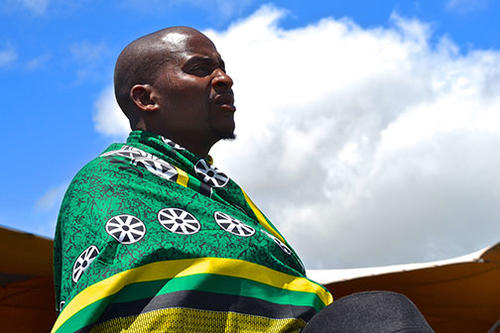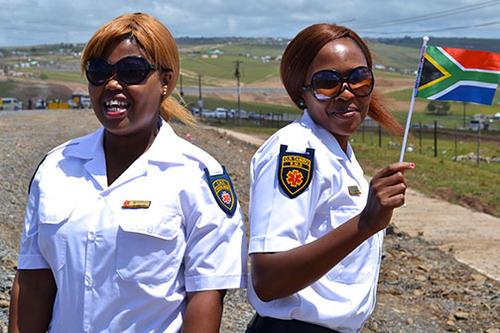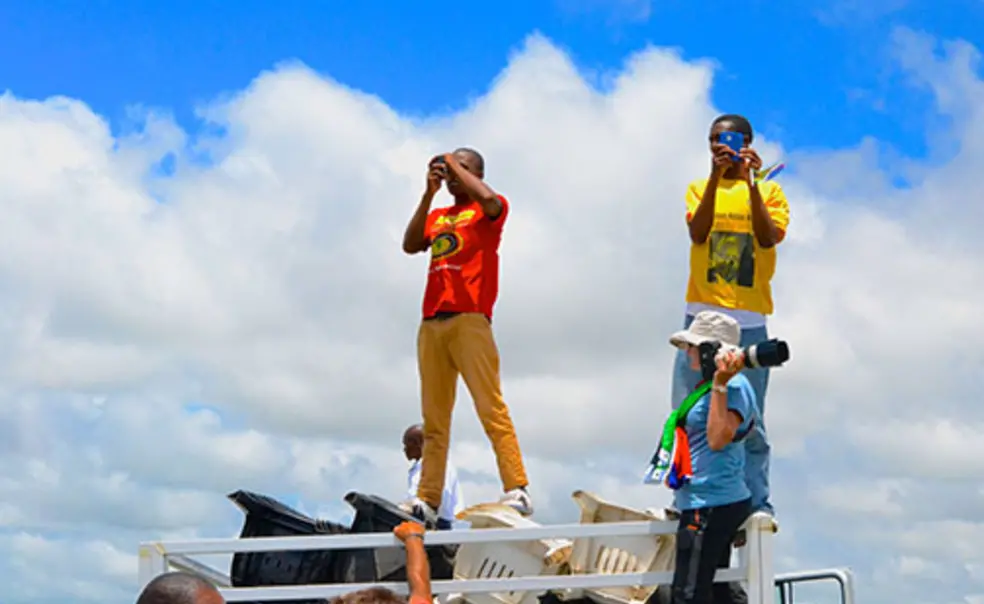Essay: Christina Laurenzi '13
I woke up on a clear, perfect morning in the village of Zithulele to the news that Madiba had died. Contrary to the questions that many friends back home had immediately asked — “Is it crazy there right now?” — that morning felt much like any other in the Transkei, which has since been incorporated into the O.R. Tambo District, in South Africa’s Eastern Cape province. Goats and sheep roamed along the road, bleating persistently; minibus taxis honked as they swung by recklessly to pick up passengers; and in every direction, colorful thatched-roof huts dotted the lush green hills that extended towards the nearby sea.
Mandela, too, once walked these hills; Qunu, his birthplace and now place of burial, is just one hour from where I live. Having majored in Politics and written my thesis on South African governance and NGOs, I felt compelled to pay tribute to Mandela. While the nearest memorial service would have been a seven-hour drive, Madiba would come to rest practically in my backyard. But I also felt something less defined, a desire to experience the atmosphere, to be with others at Qunu, to understand the less tangible aspects of how Mandela touched this country. I decided that I had to make it to Qunu.

The week leading up to the funeral, however, exposed contradictions to me in a new light. Far from the global critiques circulating the news — the now revered, fondly remembered Mandela was once labeled a terrorist, and so on — these contradictions emerged in daily life here. The O.R. Tambo district is one of the country’s poorest, and in many ways, it seems that there is less time to mourn a national hero when water must be fetched, clothes washed, cattle tended to. Reflecting on and connecting the amazing leadership he exercised, the struggle he embodied, the sacrifices he made both in prison and as president, to the daily lives that people lead here, the inconsistencies and frustrations and disasters in service delivery that I encounter in my work, it seems that things don’t quite add up. While South Africa has forged ahead as a whole, in areas like Zithulele, life seems to have changed little.
In the first six months of my ReachOut 56-81-06 fellowship, I have spent most of my time coordinating a research project that is following infants for their first year of life. The surveys collect information from more than 450 participants about access to health-care services, child development, HIV, household composition, food security, maternal mental health, and more. The hope is that the results of the study — which is a collaboration among Zithulele Hospital, Stellenbosch University, and Philani Nutrition Project, the NGO where I am based — will be used to shape provincial policy and improve clinical care. The Mentor Mothers program that Philani runs can benefit further from such information, to tailor training or other interventions for their cadre of community-health workers focusing on maternal and child health and nutrition.
Zithulele is unusual in that it has five NGOs working in tandem with each other, and with the district hospital in town. The challenges that individuals and communities face here are daunting indeed — understaffed and understocked clinics, a disjointed and struggling education system, a combination of vast distances to cover, poor roads and limited transport, few opportunities for employment or advancement, the list goes on. It is foolish to think that these issues can be fixed easily, or erased easily, just because there is a functioning government and economy. It was, however, disheartening to listen to Mandela’s memorial service in Soweto on the radio from the comfort of the Philani car, as we drove past long lines of old grannies and young mothers waiting in the mud and pouring rain for their monthly grants.
I grappled with placing Mandela’s death in context with these observations throughout the week, hearing stories from strangers and friends alike. My colleague and housemate Ncedisa, a Xhosa woman in her early 50s, recalled the assurances that many black South Africans felt as they voted for the first time in 1994, that “democracy” meant that they immediately would obtain big new houses and cars, that the tide would turn in a moment. A fellow taxi passenger, a stylish high school kid who later shared his dreams of a career in hip hop, asked if I had heard that the “great father of our nation has passed” and launched into his entire explanation of how important Madiba was. Another friend my own age explained how, with a white mother and mixed-race father, she and her siblings never would have even been able to grow up in South Africa without the changes that democracy brought.

Upon arriving at Qunu, I was able to observe a different sense of camaraderie, to put aside the difficulties I had been considering, and to gain a better understanding of what it meant to those gathered in Qunu that day to see Madiba off. We couldn’t get very close, as military personnel with automatic guns and larger-than-life trucks guarded the perimeter, but we settled at the top of a big hill, in the middle of the town of Qunu, where tents and a large screen had been set up.
Although there seemed to be a decent-sized crowd, it wasn’t overrun in the way that I was expecting; getting to the tent, to the front of the viewing area even, was remarkably easy. In some ways it felt like an event where people knew each other, instead of one where you feared getting lost in the crowd. Onlookers from every walk of South African life sat peacefully under low-lying tents, watching the big screen where the ceremony was being shown, and the media swarmed through the crowd, interviewing, photographing, videotaping. A crowd of police officers sat together at the back of one tent, the media hovered at the front of another. Our view was amazing, looking down onto the funeral tent in the valley below and past that, onto the gentle hills that seemed to stretch far into the horizon.
There seemed to be a sense of sadness in the air, as people took in what it meant that Madiba’s funeral was happening just a few kilometers down from us. In some ways, it felt removed, almost surreal; lacking the same invigorating buzz as Madiba’s inauguration, or his memorial services, this was a quieter coming home. In some ways, it felt very “Transkei” — I almost laughed at myself when I thought of my expectations for a shoulder-to-shoulder crowd in a part of the country that is particularly spacious and open, even with thousands of people in attendance. For the 4,500 invited to the funeral, I’m sure it was a spectacular event to behold, although the eulogies and thanksgivings seemed to be full of clichés and funny turns of phrase. For us onlookers up top, however, it was a different kind of reflection, coming together, interacting, observing. Trying to capture moments and wistful faces and Mandela T-shirts in photographs, trying to make sense of what this next stage meant. Some parts of the ceremony elicited clapping and others, we joined in song that stirred up from most corners of the tents. When the military planes roared overheard, we joined together and cheered them on. There were makhulus holding grandchildren, men in dark gray suits and ties and sunglasses, young Xhosa women dressed up beautifully in makeup and crazy high heels, weather-worn photojournalists snapping away, switching lenses, men from the village donning yellow “Vote ANC” T-shirts, children waving South African flags, white women in traditional Xhosa patterned skirts, families, individuals, couples, babies.
It was everything I hoped it would be, although it was far simpler and relaxed than I perhaps expected. It seemed a fitting way to pay tribute to a great leader, sitting in the hills of the Transkei, watching the clouds pass overhead and being with people who wanted to be there in person to watch over Madiba one last time.












No responses yet